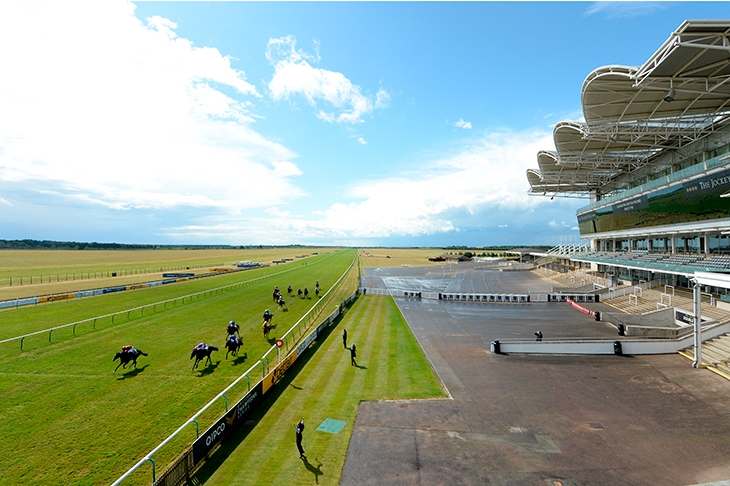Fortunately for me and the politicians we entertained over my years covering the darkest profession, Mrs Oakley didn’t do a Sasha Swire and keep a gloriously indiscreet diary. Indeed her rule was that politicians who came to our house and talked only about themselves didn’t get invited a second time, a test that was frequently failed. The Swires’s guests, especially the Cameroons, seem to have talked about nothing else.
But Mrs Oakley can on occasion do the Swire sardonical. As our young flatcoat retriever, who longs to grow wings, disappeared over the horizon last weekend in pursuit of an indignant partridge, a one in three gradient loomed and I puffed that I wouldn’t be talking much for the next few minutes. ‘And that’s somehow something out of the norm?’ came the wifely rejoinder.
Will the sport survive if we go another six months without at least some crowds on the racecourse?
Mrs O.’s simpatico style ensures that we cannot pack our goods at Waitrose without checking on the cashier’s ailing mother. By contrast, she has been known to chide, my natural chat-rating puts me somewhere between a Trappist monk and an Easter Island monument — unless I’m on a racecourse. But that’s the thing: racecourses are sociable places. ‘How did you do in the last? What do you fancy for the next?’ Game girls of a certain age who have observed my friend the form guru and me poring over notes come up to seek a tip. Punters all around the paddock share smilingly in the exuberant celebrations of successful syndicate owners and in trainers’ explanations of their triumphs. ‘What is the plan now? That was the plan.’
Or so they all did. Nowadays racecourses are sad, empty, literally characterless places attended by only a sprinkling of closely involved professionals. We can all still thrill to the courage and skill of a perfectly timed finish on TV, but there is an element missing. Racing behind closed doors is like a piece for full orchestra being played by a string quartet at the end of an aircraft hangar. It lacks context and emotion. Take the Autumn Double. At Newmarket a fortnight ago, there would have been a fervent welcome-back quality to the applause as veteran jockey Paul Hanagan confirmed his successful return from a broken back by winning the Cambridgeshire Handicap on Majestic Dawn. Last Saturday, after Jason Watson took jump jockey Paul Townend’s advice and weaved through beaten horses on Great White Shark to land an incredible third successive Cesarewitch for Willie Mullins, the message conveyed by an applauding crowd would have been: ‘Yes, Jason: we know it’s been a leanish season by your high standards but we know you’ve still got it.’ Racing is all about a joyous collectivism, and two things worry me. Will the sport survive if we go another six months without at least some crowds on the racecourse, and are the various authorities involved fighting hard enough to ensure that some spectators are allowed back?
Racing, the most watched sport in the country after football, has demonstrated conclusively over four months behind closed doors that it can organise itself responsibly with appropriate social distancing. Before the government pulled the plug on plans for elite sports to allow back some spectators on 1 October, Doncaster and Warwick conducted successful pilots. Most racing spectators arrive by car rather than public transport and spend the day in the open air. Though racing-colours scarves may be worn to show support for favourite horses, racing followers, unlike football fans, are not split into potentially clashing rival tribes who might mingle dangerously.
Nor is there any logic about the current position. The public may use bars and restaurants on racecourses provided there is no racing that day. Except in high-risk areas, people from more than one household can go to a pub and watch racing together on TV. The Prime Minister is encouraging people to save jobs in entertainment by going to the cinema, and venues such as the Royal Albert Hall and the O2 are to admit limited crowds from December. Yet the message to racing is that crowds are unlikely to be permitted on track for another six months. Racing’s authorities have been pressing behind the scenes for change but have so far done so comparatively quietly, partly for fear of losing what we have already — the racing behind closed doors that does at least bring some income into the sport — and partly, I suspect, because racing, which has plenty of enemies in the media, is seen wrongly as a sport for well-connected toffs and doesn’t want to be seen as conducting special pleading when so many other industries are in a mess.
The time has come for racing’s case to be made with much more vigour — asking not for handouts but simply to be allowed to conduct more well thought out and limited admission schemes. If we have to wait six months to get back on track, racing habits and loyalties will die and there will be a lot less racing to return to.






Comments